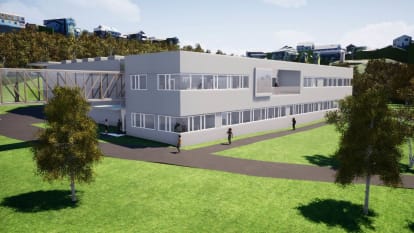Valgrinda/NTNU, Trondheim
The Valgrinda project is a 2,617 square meter laboratory with high environmental ambitions that NCC is building for the Norwegian University of Science and Technology (NTNU) in Trondheim. Valgrinda is the first fossil free construction site north of Oslo.
NTNU and SINTEF Geo will share the premises with Petroleum at Valgrinda, forming the joint Department of Geoscience and Petroleum (IGP). This is the first step in an ongoing restructuring of the university’s departments and campuses.
The turnkey contract is a partnering contract worth NOK 80 million excl. VAT. The construction work is scheduled to start by the end of June 2018 and be completed by June 2019.
Clear sustainability goals
The project has ambitious climate and environment-related goals: in addition to fossil free construction, NCC is implementing its own eco-concept, called “Sustainable Construction Site”. Renewable site power will also be used, and the project aims to achieve a waste recycling level of over 90 percent. Eco-concrete, where 20 percent of the cement is replaced with fly ash, will be used to reduce landfill.
Exceeding the regulations
With the newbuild in Valgrinda, NTNU wishes to go beyond the applicable regulatory criteria. They are keen to try out innovative solutions to reduce energy demand and generate their own energy. Construction of the building and its integration with NTNU’s energy systems and neighboring buildings will provide valuable experience that can be applied to the planned large-scale campus expansion, for example.
Data to be used in teaching
There has been a strong emphasis on the calculations being based on realistic conditions, since university buildings often have a significantly different pattern of operation compared with other buildings. This tends not to be captured in standardized energy calculations, which results in the importance of energy being underestimated. Data from the project will be available for use in research and development at NTNU. Solar panels on the roof will provide the operational organization with valuable experience concerning the operation and maintenance regime, which can help to reduce the risks associated with future installations of solar capacity on campus.
